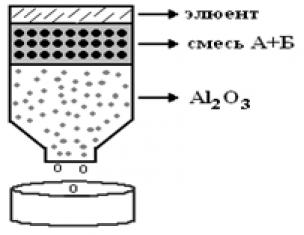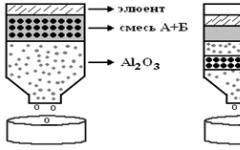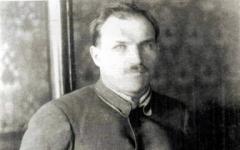In French, there are masculine and feminine genders of adjectives. There are the following ways to form the feminine gender:
1)
Added - e to
masculine gender which is singular. For example: petit - petite, gris - grise.
2)
If the adjective is masculine
ends:
C (pronounced in speech) feminine ending
will be que. For example: public - publique.
C (which
not pronounced in speech) in the feminine gender will have the ending che. For example: blanc -blanche.
3) If the adjective is masculine
kind ends in - f then in
formation of the feminine gender it changes to -
ve. For example: neuf - neuve.
4) The ending g in the masculine becomes gue in the feminine. For example: long - longue.
5) The ending al changes ale
and at the same time l not
doubles. For example: amical -amicale.
6) The masculine ending el in the feminine forms elle, and also ul becomes ulle and when
this does not change the pronunciation. For example: cruel - cruelle, nul - nulle.
7) If a word ends in eil, then when it becomes feminine it acquires the ending eille, but the pronunciation remains the same. For example: pareil -pareille.
8) In the masculine il, then in the feminine ile. In this case, l does not double. For example: civil - civile.
9) The ending n becomes feminine ne, and words that end in on receive the ending onne.
For example: fin
- fine, bon - bonne. Available
and exception: paysan - paysanne.
10) The ending ien is converted to ienne. For example: Italien -Italienne.
11) When the adjective is standing
in the masculine gender it has an unpronounceable ending er then to form the feminine gender
add e and the “`” sign. For example: premier -
premier.
12) The ending eur changes to euse, and teur to touse (if
This is an adjective formed from a verb which in the infinitive has a t before the ending). For example: rieur-rieuse, flotter (verb) - flotteur(
masculine adjective) - flottouse (feminine). All
other adjectives not formed from a verb with a t in the root are formed in the following way: teur - trice. For example: protecteur
- protectrice.
13) Some adjectives
of Latin origin having the masculine ending eur forms eure. For example: anténeur - anténeure.
14) s changes to se gris-grise. There are exceptions: frais -
fraiche, tiers - tierce.
15) Several adjectives double s: gros - grosse, gras -
grasse, las - lasse, métis - métisse, expres
-expresse, épais - épaisse, profès - professe, bas - basse.
16) Masculine et in feminine ette. For example:
coquet - coquette. There are ten adjectives that
end in et - ète: complete-
complète, concret - concrète, secret - secrète, incomplete - incomplète, indiseret - indiserète, inquiet - inquiète, désuet -
desuète, discret - discrete,
quiet -
quiète, replete - replete.
17) In the masculine ot in the feminine ote. For example: idiot -idiote. There are words in which the t is doubled: sot -sotte, boulot -doulotte, vieillot - vieillotte.
18) The masculine ending eux in the feminine euse and oux - ouse. For example: jaloux - jalouse.
Exception words: beau
- belle, jumeau - jumelle, mou - molle, vieux - vieille, nouveau - nouvelle.
As is known, adjective- this is a part of speech that denotes the quality, property or belonging of an object and answers the questions “which?”, “which?”, “which?”, “which?” or “whose?”
In French, adjectives change according to gender and number, that is, they depend on the noun they refer to.
Rules for using adjectives
An adjective can be used without a noun and be part of a compound nominal predicate, for example: Il est petit- It's small. In this case, the adjective agrees with the subject in gender and number: il– masculine and singular pronoun. If in place of the subject there is a pronoun or a feminine noun, then the ending will be added to the adjective "e": Elle est petite.- She's small.
However, you need to remember that some masculine adjectives already end with the letter "e", this means they do not change by birth. There are few such adjectives, you need to remember them:
rouge- red
jaune- yellow
jeune- young
beige- beige
triste- sad
rose- pink
Some adjectives have a masculine gender after adding a vowel "e", the final consonant is doubled. This happens with adjectives with the following endings:
1. -en/-enne: europeen – europeenne(European)
2. -ien/-ienne: italien – italienne(Italian, -aya)
3. -on/-onne: mignon– mignonne(cute)
4. -as/-asse: bas-bass(low)
5. -os/-osse: gros-grosse(big)
6. -el/-elle: habituel - habituelle(regular)
7. -eil/-eille: pareil - pareille(similar)
8. -et/-ette: cadet - cadet(junior)
There are exceptions to this rule. Remember these words:
complet – complete(filled in)
concret – concrète(specific)
discrete– discrete(modest)
inquiet – inquiet(restless)
secret – secret(secret)
Adjectives ending in -eux or -eur in the masculine gender change to –euse: courageux - courageuse (brave). A similar rule applies to adjectives ending -teur: Feminine adjectives in this case receive endings -trice/-teuse: menteur - menteuse (lying). And the adjectives on -f in the feminine gender they get the ending -ve, for example: sportif - sportive.
If a masculine adjective ends in -er, then in the feminine it has the ending -ère: fier - fière (proud -aya), and the ending -With is changing -que: turc - turque (Turkish).
Some adjectives do not change their forms according to the rule. Try to remember:
vieux – vieille(old)
gentil – gentille(darling)
blanc - blanche(white)
frais – fraîche(fresh)
franc – franche(free)
sec – seche(dry)
doux - douce(gentle)
long – longue(long)
favori – favorite(favorite)
Interestingly, some adjectives have two masculine forms.
Adjectives beau, nouveau, vieux have two masculine forms in the singular: Forms beau, nouveau, vieux used before nouns starting with a consonant: un nouveau cafe- new cafe.
Forms bel, nouvel, vieil used before nouns starting with a vowel or silent h, For example: un vieil ami- old friend.
In the feminine gender, these adjectives use one form: belle, nouvelle, vieille.
Lesson assignments
Exercise 1. Form feminine adjectives.
1. conservateur 2. jeune 3. noir 4. doux 5. sérieux 6. joli 7. actif 8. beau 9. ancien 10. muet
Answer 1.
1. conservatrice 2. jeune 3. noire 4. douce 5. sérieuse 6. jolie 7. active 8. belle 9. ancienne 10. muette
An adjective in French is an important and integral part of speech that allows you to define an object, its properties and characteristics. It changes in gender, number and degree of comparison, which agree with the gender and number of the noun to which it refers.
Gender and number of adjectives (briefly)
We have already discussed such a grammatical phenomenon as . Here we will consider only the basic concepts.
How the feminine gender of adjectives is formed: a masculine adjective receives the ending – e to form the feminine gender. For example:
- Grand – grande – big – big
- Petit – petite – small – small
- Rusé – rusée – cunning – cunning
For example: une petite fille (little girl) – un petit garçon (little boy)
If the adjective ends in - With, in the feminine gender the ending changes to - che :
- Blanc c– blan che– white – white
- Fran c– fran che– open – open
- Se c– sè che– dry – dry
For example: Un homme fran c(frank man) – une femme fran che (outspoken woman)
Agreement of adjectives in gender and numberEnding – eur euse :
- Ment eur–ment euse- deceitful - deceitful
- Moq ueur–moq ueuse– mocking – mocking
For example: un garçon menteur (lying boy) – une fillette menteuse (lying girl)
Ending – teur in the feminine gender it changes to - trice:
- Observa teur– observa trice– observant – observant
- Interroga teur– interroga trice– interrogator – interrogator
For example: un professeur observateur (observant professor) – une élève observatrice (observant student)
Ending – eau goes into - elle:
- Nouv eau–nouv elle– new – new
- Jem eau– jum elle– similar – similar (twin – twin)
- B eau–b elle- beautiful - beautiful
For example: un nouveau ami (new friend) – une nouvelle amie (new friend)
Masculine ending - ou becomes feminine - olle:
- F ou– f olle– crazy – crazy
- M ou–m olle– soft – soft
Silent ending - s in the masculine gender it becomes voiced in the feminine gender:
- Françai s– françai se– French – French
Ending – f in the feminine gender it changes to – ve:
- Neu f-neu ve– new – new
Ending – eux goes to - euse:
- Heur eux–heur euse – happy – happy
Some French adjectives do not fit any rule, so you need to remember them:
- Bass – basse – low – low
- Blanc– blanche– white – white
- Frais– fraiche– fresh – fresh
- Gros– grosse– thick – thick
- Long– longue– long – long
- Pais– paisse– thick – thick
- Doux– douce– sweet – sweet
Plural adjective
The adjective in French also changes in number.
The general rule for forming plurals is to add the ending - s to a singular adjective.
- Différent – differents – different – different
- Petit – petits – small – small
- Pointu – pointus – sharp – sharp
Feminine adjectives have the same ending:
- Différente – differentes – different – different
- Petite – petites – small – small
- Pointue – pointues – sharp – sharp
Adjectives ending – al in the plural they get the ending - aux:
- Vertical – verticaux – vertical – vertical
Endings – s or - x in the plural remain unchanged:
- Gros – gros – thick – thick
- Heureux – heureux – happy – happy
 Everyone has a friend like that: examples of adjectives
Everyone has a friend like that: examples of adjectives Adjective location
In Russian, we are accustomed to the fact that the adjective is placed before the word that it defines: a cozy home, a beautiful girl, a tall man, etc. In French the situation is different.
Most adjectives are found after the word they define: un homme heureux, une chambre comfortable, un ami hospitalier.
Before nouns
The following adjectives are placed before the noun:
- Autre – different
- Beau (belle) – beautiful
- Bon (bonne) – good, kind
- Grand (grande) – big
- Gros (grosse) – thick
- Haut (haute) – tall
- Joli (jolie) – cute
- Long (longue) – long
- Mauvais (mauvaise) – bad, evil
- Nouveau (nouvelle) – new
- Petit (petite) – small
- Vilain (vilaine) – nasty
- Jeune – young
- Vieux (vieille) – old
BUT: if an adverb is used with these adjectives, then both words are found after the noun: un garçon très haut - a very tall boy. And if such adjectives have an addition, then they are also placed after the noun: le vin bon à boire - wine good for drinking.
Position of evaluative adjectives
Some French adjectives can be placed both before and after the noun. They do not change their meaning. These are evaluative adjectives that can be placed either before or after a noun without changing the meaning. But, if they stand before a noun, they acquire a subjective meaning. These are the adjectives:
- Délicieux – delicious; delicious
- Magnifique - beautiful
- Splendide - magnificent
- Superbe - amazing
- Horrible - terrible
- Extraordinaire - extraordinary
- Etonnant – amazing
- Formidable - incomparable
- Parfait is excellent
- Râvissant - beautiful
- Passionnant – exciting
- Merveilleux - wonderful
- Incroyable - incredible
- Admirable - wonderful
- Epouvantable - terrifying
- Excellent - excellent
- Remarquable – wonderful
The meaning of an adjective depending on its position
An adjective in French changes its meaning depending on its position. That is, when they are in front of a noun, they have one meaning; when they are after a noun, they take on a different meaning. Pay attention to the pattern of adjectives and their translation depending on their position: adjective – meaning after a noun – meaning before a noun.
- Amer – bitter (tastes) – bitter (figurative)
- Ancien – ancient – former
- Antique - antique - ancient
- Bas – low – low (figurative)
- Brave - brave - decent, nice
- Certain - certain - some
- Chaud – warm – warm (figurative)
- Cher – dear – dear (in circulation)
- Doux – sweet – tender
- Dur – hard – heavy
- Fameux - famous - excellent
- Faux – deceitful – false
- Fier – proud – rare, notorious
- Fin – subtle – skillful
- Fort – strong – intense
- Fou - crazy - crazy
- Franc – direct – obvious
- Froid – cold – cold (portable)
- Furieux – angry – very strong
- Gris – gray – sad
- Léger – light – frivolous
- Maigre - thin - pathetic, meager
- Méchant - evil - insignificant
- Mince - thin - insignificant
- Mortel – mortal – mortal
- Mou – soft – soft (figurative)
- Noble - noble - noble, sublime
- Pâle – pale – pathetic
- Pauvre – poor – unhappy
- Pieux – pious – good
- Plaisant – pleasant – cheerful
- Propre – pure – own
- Rare – rare – rare (figurative)
- Riche – rich – expensive (figurative)
- Royal – royal – royal (figurative)
- Rude – hard, harsh – big, strong
- Sacré – sacred – damned (BUT: in the names le Sacré Collège, Sacré-Cœur means “holy, religious”)
- Saint - sacred - holy
- Sale - dirty - vile, vile
- Seul – lonely – the only one
- Simple - simple - ordinary
- Triste – sad – bad
- Unique - the only one - the only one of what was
- Vague – indefinite – insignificant
- Vrai - truthful - true, real
- Vert – green, unripe – vigorous
- Vif – alive – strong (figurative)
But what to do if there are several adjectives that define a word? In this case, you need to start with a more general characteristic, moving on to a specific one (that is, from the general to the specific):
- Une voiture japonaise noire – black Japanese car
- Un vin blanc français – white French wine
The adjective occupies a fundamental place in the French language, since it is this part of speech that will help you in describing events and actions. Use as many adjectives as possible, look for synonyms for them, this will make your speech much more interesting and richer!
The placement of French adjectives is a puzzle of the French language that all students face sooner or later. Why a mystery? Yes, because, at first glance, it seems that there is no logic where the adjective should be placed, because in some cases it comes before the noun, in others – after. For example: “Mon père est un homme grand”, “Louis XIV est un grand homme”. What to do? How do you know where to put an adjective in French? There is a way out - learn some rules!
So let's begin. The most important rule: most French adjectives come after the noun(J'ai regardé un film intéressant).
After a noun adjectives are always used:
1. Relative adjectives (to make it easier to understand: you cannot put the words “très”, “peu”, “beaucoup” between an adjective and a noun): une usine métallurgique (we cannot say “a very metallurgical plant”);
2. adjectives denoting colors: une robe jaune, une fleur rouge;
3. adjectives with the meaning of the form: une table ronde;
4. adjectives denoting nationalities: un plat chinois, des parfums français;
5. adjectives indicating religion: une tradition catholique;
6 . les participe présents (-ant) et passés: une fille amusante, des feuilles mortes;
7 . adjectives followed by an object: un livre intimate à lire
8. You should also pay attention to the number of syllables in the adjective and noun. If the noun is monosyllabic (that is, it has one syllable), and the adjective is polysyllabic (that is, it has two or more syllables), then you need to put the adjective after noun: un mot étranger. The same rule applies if both the noun and the adjective have one syllable in their composition: un mot court.
Pnext nouns are put:
1. some adjectives: grand, gros, petit, bon, mauvais, beau, joli, jeune, vieux, long, haut, large, double, demi, nouveau : un nouveau livre, une jolie fille, un long chemin;
2. ordinal numbers (in Russian they are not adjectives, but in French they are included): le premier pas, le deuxième livre
Before or after nouns are given adjective evaluations, that is, they can be placed either after or before the noun, while the meaning of the expression does not change: un paysage formidable, un formidable paysage. The French themselves say that in this case you can use the rule of “euphony”, that is, as the expression sounds better, you can use an adjective.
There are also a number of French adjectives that, depending on their position, change the meaning of the expression, but we will talk about them in the next article. See you soon!
Adjectives in French are an integral part of a sentence, allowing one to define an object, its properties and characteristics. They change in gender, number, degree of comparison, which agree with the gender and number of the noun to which they refer. In the French language, unlike Russian, there are only 2 genders - masculine and feminine (in Russian there is a neuter gender). The feminine gender is formed by adding the ending - e to the adjective. It is necessary to pay attention to the fact that the pronunciation may remain unchanged if this ending is added to vowels or to pronounced consonants, as well as consonants -r and -l, for example, lumière (f - zh.r.) noire - black light, point (m - m.p.) noir - a dangerous place, or change if the ending is added to an unpronounceable consonant, for example, un grand personnage - a noble person, une grande nouvelle - important news, les grandes dates - the most important dates.
If the masculine gender has the ending -e, -able, -aire, -ique, -iste, etc., the form of the adjective in the feminine gender remains unchanged, for example: activité économique (f.r.) - economic activity, délit économique (m .р.) – economic offence; poisson rouge (m.r.) - red fish, une tomate (f.r.) rouge – red tomato.
When using adjectives in French, if the masculine and feminine forms of the adjective differ, you must adhere to the following rules:
- 1. If an adjective in the masculine gender ends in a voiceless consonant –s, then it becomes a voiced consonant in the feminine gender, for example, le livre français - French book, histoire française - French history.
- 2. If a masculine adjective ends in -en, -ien, -on, -et, the consonant is doubled and the ending -e is added, for example, ancien professeur - former teacher, ancienne cour - former court. But there are a number of exceptions to this rule, which are presented below:
complete – complete; filled; complete: gel complet – complete freezing, ruine complète – complete ruin (f.r.).
concret – concrete: but concret – a specific goal, musique concrète – concrete music (f.r.).
inquiet – worried, un homme inquiet – worried man, une femme inquiète – worried woman (female).
secret secret: service secret – secret service, issue secrete – secret exit.
- 3. If an adjective in the masculine gender ends with a consonant -f, then this ending becomes -ve in the feminine gender, for example, pensée neuve – fresh thought (f.r.), costume neuf – new suit.
- 4. If a masculine adjective ends in -er, -ier, these endings take the feminine accent grave over –e, for example, investissement étranger—foreign investment, affaire étrangère—foreign business.
- 5. If an adjective in the masculine gender ends in -eux, this ending becomes –euse in the feminine gender, for example, air heureux - a joyful look, heureuse expression - a successful expression (f.r.).
- 6. If a masculine adjective ends in -iel, -el, the letter -l in the feminine is doubled, for example, center industriel – industrial center, psychologie industrielle – engineering psychology (zh.r.).
Certain French adjectives do not fit more than one rule, and their masculine and feminine forms must be remembered:
bas– basse– low,
blanc– blanche– white,
beau– belle– beautiful,
frais– fraiche– fresh,
franc – franche – frank,
gros– grosse– thick,
long– longue– long,
nouveau– nouvelle– new,
pais– paisse– thick,
sec– sèche– dry,
doux– douce– sweet.








